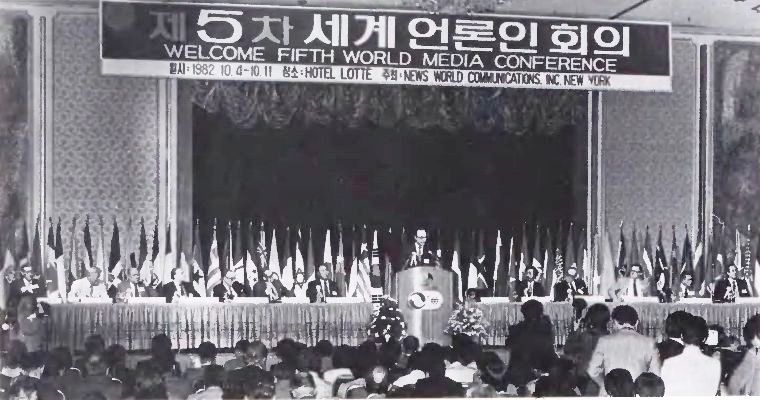![]()
The Words of Sun Myung Moon from 1982
|
|
The Words of Sun Myung Moon from 1982 |

Excerpts of Father's speech at the opening of the World Media Conference in Seoul, Korea, October 4-11.
Honorable Chairman, distinguished guests, and ladies and gentlemen. I am very pleased and deeply grateful that you have come to Korea to attend this Fifth World Media Conference.
The Media Conference brings together prominent communications professionals from all parts of the world to seek a greater understanding of the responsibility of the media in today's society. The scope of the conference is global, and the understanding which we seek is international. It is, therefore, particularly appropriate to hold this event in the nation of Korea, for it was here, 32 years ago, that 16 nations of the free world joined forces to turn back the unprovoked North Korean invasion of the South. This is certainly one of the noblest examples in history of unselfish international cooperation. The people of Korea will never forget the tremendous service which the United Nations rendered in the face of such a serious violation of international peace.
It is also particularly appropriate for this gathering to take place in Korea, because it is here that the great cultures of the world are today coming together. Korea is unique among the Asian nations. Here the ancient culture and way of life has been preserved largely unchanged for five thousand years. The purest Oriental culture in the modern world is to be found here.
At the same time, many of the major religions of the world have come to Korea and have flourished here. Christianity, the spiritual core of Western culture, has taken deep root and is thriving in Korea. While Christian churches stand empty in many parts of the world, Korean Christian churches are alive with prayer and worship at all hours of the day and night.
Korean Christianity is the fruit of the Western tradition of spirituality and faith in God which has been passed down from the Hebrew prophets, through the Christian saints, and into the world of today. Across the 38th parallel of Korea, this Hebraic tradition confronts the external, Hellenistic tradition in its most extreme form.
A world which denies God is opposing a world which accepts God, and Korea is the place where these two worlds collide. The Korean War was the embodiment of the clash between these two worlds. It was not merely a local conflict: it was a global war involving the forces of world communism and the forces of the United Nations. The Korean peninsula is a microcosm of the world, and it could be said that the problems of the world are encapsulated in the Korean peninsula. This being the case, the solutions which are developed and successfully applied in Korea are not merely local solutions: they can become solutions for the world.
What type of solution is necessary? The struggle is a struggle of ideas, a struggle of belief, philosophy and ultimately, of ideology. If God exists, then atheism must be wrong; if there is no God, then materialism must be correct. Since two contradictory beliefs cannot both be true, then there must be a showdown in which truth will prevail.
We believe there is God. It is therefore our most important duty to make that God real in our lives, and make that God indisputable in our world. By doing so, we will bring the ultimate solution to atheism and materialism. For this task, the Unification Movement has been established. Korea is the logical place for this movement to have begun.
I would like to take this opportunity to share with you some of the experiences which led me to establish the Unification Movement. When I was 16 years old and was living in the northern part of Korea, I began to have a series of extremely significant experiences.
It is difficult for me to describe these experiences to you in words. I can say that the spiritual world was opened to me, and I was able to freely communicate with the saints of that world. In the solitude of the mountains of northern Korea, I communicated many times with Jesus and God Himself. The truths which were revealed to me at the time now constitute the core of the Unification teaching.
After having these experiences, I established the Unification Church, and from this the Unification Movement has come about. The Unification Movement will bring solutions to the most grave problems which face mankind today:
1. The Unification Movement will bring about a positive solution to the problems of atheism and materialism. To achieve this, a spiritual awakening must occur -- a spiritual awakening which will provide the necessary foundation for the solution to the physical problems of mankind.
2. The Unification Movement will bring about cooperation between the religions of the world and the unification of all religions into one God-accepting force. The original mind of man recognizes the common Creator and Father. Under this common Father, we can and must unite into one human family.
3. The Unification Movement will bring about a moral world. This is especially important for today's young people. In the absence of an absolute moral standard, immorality is becoming rampant. A greedy, self-centered way of life, in which others are seen as merely to be used for personal gain, is popularly approved and even encouraged. If this continues, it will certainly lead to the destruction of society.
In bringing the unique message of Unificationism to the world, I realize that I have often been misunderstood by the media. If anyone could justifiably feel unkindly toward the media, it would certainly be me. I feel, however, that rather than being offended by the attacks of the media, I should be flattered that you have given me so much attention. Of course, I have consistently provided the press with a most valuable service -- I have given you a lot to write about. Keeping track of Reverend Moon, the media has never had time to get bored.
In fact, I have no ill will toward the media corps, for I have great faith that the tremendously good potential of the media will ultimately be fulfilled. Up until this time, I have not been properly understood. Ignorance invites misunderstanding, and misunderstanding invites distortion. The reason why I am speaking to you today is to improve the understanding between us. I don't avoid speaking to you -- because it is my duty to communicate the truth, no matter how impossible this task may seem to be.

Most recently, there is a great deal of excitement regarding myself and the movie Inchon. The film cost almost $50 million to make and has a cast of famous Hollywood stars. Many people have been asking why Reverend Moon, being a religious leader, would be so interested in a Hollywood movie. I would like to give you my own personal explanation.
I had two reasons, and neither of them involved making money. The first was that I wanted to document the historical fact that it was the North which invaded the South in the Korean War. Over the past 30 years, there have been persistent efforts to distort this fact of history.
The second reason is that I wanted to pay tribute to General Douglas MacArthur. General MacArthur loved God and loved mankind, and he wanted to do battle for God and mankind. In 1950 the very existence of Korea and the Korean people was in jeopardy. General MacArthur was motivated by a deep desire to do God's will. Through remarkable faith in God, he planned and executed the Inchon landing, a masterpiece of military strategy -- and an impossible mission became a great victory.
There is also a very personal side to my involvement in the making of this film. When the Korean War broke out, I was being held in a prison camp in North Korea. I cannot begin to describe the horrible conditions of that camp. Most prisoners died within six months; but with the help of God, I endured the life in that camp for almost three years. Following the Inchon landing, as the United Nations' forces were fighting northward up the peninsula, guards began executing all the prisoners in the camp. Just hours before I was to be taken out and executed, I was liberated by the U.N. forces. Inchon is my way of saying "thank you" to General MacArthur.
The presence of Ambassador MacArthur, Chairman Rusher, and the others here at the head table, as well as all of you, gives me the highest hopes for this meeting. Please work hard these next few days, and when the conference is over, I want you to have a chance to relax as my guests. I would like to show you my country and have you feel, when it is time to leave, that what you want to do most is come back for another visit.
Thank you for coming, and may God bless you.